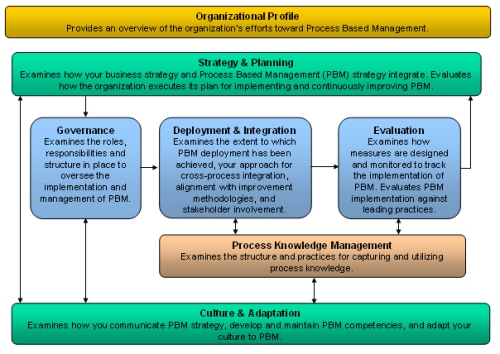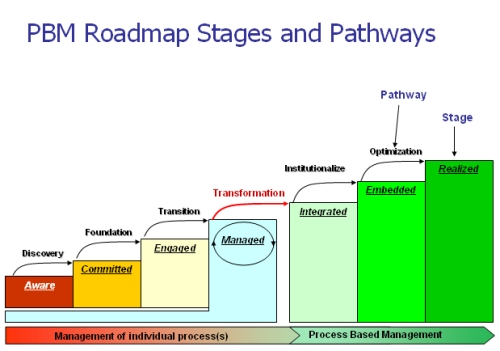At each BrainStorm BPM Conference, there is constant discussion around how organizations can improve their processes and move to a process focus. This is not new. A focus on the process dimension of work and process-centered improvement approaches has been on most organization’s radar screens since the 1993 release of Reengineering the Corporation by Michael Hammer and James Champy.
Since then, we have seen a continued emphasis on many elements of Total Quality Management and the Baldrige Criteria, plus the emergence of process improvement methodologies such as Six Sigma, Lean, and Capability Maturity Model Integration. In the last 5 years, we have seen the emergence of BPM tools to help organizations apply technology to enable, improve and manage processes.
Most organizations now understand the need to improve and manage their processes. However, few do so in a disciplined, ongoing basis. Quite often, projects are initiated to improve a process, and when “successfully” completed, they have sub-optimized the performance of the larger system or organization. We also see process improvement efforts being viewed as a one-time events, versus an ongoing effort with the structure and commitment in place to sustain and expand on the improvements. It is commendable to improve a process and then to manage the performance of individual processes. However, the greater and longer-lasting impact comes through managing an organization’s portfolio of processes in an integrated fashion: by becoming a process based organization.
We define Process Based Management (PBM) as a holistic management approach that guides the actions and mindset of an organization. PBM has a wider scope than the management of individual processes. A process based organization explicitly recognizes that it designs, manages and improves all processes to optimize the delivery of customer value. Process based organizations use this as a guiding philosophy and as a strategy to differentiate itself and outperform its competitors.
Diagnosis Before Prescription!
Indeed, it is a challenge to become process based. This journey does not occur quickly. It requires commitment, time, and a comprehensive plan. The PBM Implementation Roadmap was developed to improve the odds of success on this journey. The Roadmap guides organizations in their pursuit of becoming process based, and enhances their likelihood of sustaining success.
However, many organizations attempt to prescribe, without a proper diagnosis, a specific approach or tool which they believe will enable a successful change in the mindset and structure of an organization towards process-based thinking. You would not go to the doctor and get a prescription without first being assessed of your symptoms – that would be life threatening!
To enable organizations to effectively diagnose their progress in implementing process-based thinking, we led the Process Based Management (PBM) Program effort at the Consortium of Advanced Management- International (CAM-I) which spent over 4 years developing a comprehensive PBM Assessment and Implementation Roadmap.
The comprehensive PBM Assessment shown in Figure 1 allows an organization to fully evaluate their PBM progress across multiple areas and provides a complete diagnostic capability.

Figure 1 PBM Assessment Process Strategy Group and CAM-I
Just as you would not want to go to the doctor for a diagnosis without some type of treatment, you would not do an assessment without some type of follow on actions. This why we developed the PBM Implementation Roadmap, to give organizations direction in how to address gaps identified from the assessment.
Implementation Roadmap
As shown in Figure 2, the Roadmap is organized around seven Stages and the six Pathways connecting them. The Stages represent the major levels of PBM deployment. The Pathways contain the series of detailed Steps an organization follows to advance to the next Stage. Each Step provides the what, why, who and how of the actions prescribed, as well as the tools used and outputs generated.

Figure 2: Pathways and Stages Process Strategy Group and CAM-I
An organization’s strategy, and the degree to which PBM supports accomplishing its strategic objectives, suggests the extent to which PBM should be implemented.
But how do you start on the Roadmap? By using the results of the PBM Assessment, an organization can target specific areas where there are gaps to improve their chances of success. Most organizations already have some efforts underway to improve processes. However, the groundwork has not been established to allow process thinking to take root in the organization. An assessment would identify the steps needed to establish that groundwork. Those required steps could be in any pathway, For example, many organizations with process efforts underway have not established a process advocacy group (which is one of the first steps in the Discovery Pathway)
For those organizations just starting on the journey, start at the beginning of the Roadmap with the Discovery Pathway.
The Discovery Pathway

Figure 3: Summary of the Discovery Pathway Process Strategy Group and CAM-I
Critical Actions for Discovery
From our research, consulting, case studies and experiences of member companies, we have identified some of the critical factors an organization needs to address to successfully move to a process mindset and become process based. While the Roadmap includes over 100 individual steps across the 6 pathways, here are some of the key steps in Discovery (Figure 3) an organization needs to address on the PBM journey.
- Form a Process Advocacy Group. Unless you already have a group leading the Process efforts, you need to form a group who is going to advocate for the process approach. At this stage, the group is informal, made up of the believers who are willing to put some time and effort into moving the process vision forward. One of the Process advocates probably led the assessment effort.
- Assess the organization. As indicated above, a PBM Assessment is one of the first steps an organization will take when it decides to begin the process journey. The assessment would be conducted to:
- Determine the organizations readiness: identify any roadblocks that need to be addressed before the process efforts can move forward.
- Determine the level to which your organization currently manages processes. Are there a few processes being managed, or are there many efforts with process teams in place? Do you have process owners for your key processes
- Do you have a view of your organization that is different than the organization chart?
- Identify existing programs and components to leverage. Every organization has many programs, initiatives, tools and components that are in place, or underway. Do not reinvent the wheel. Take advantage of what is already in place, and leverage them to move the efforts forward.
- Identify gaps in implementation that need to be addressed. Develop plans to address these gaps so the efforts can make progress.
- Develop an Implementation Plan. The Advocacy Group would develop and use this plan to make the case for process to a wider group in the company. The plan would move the process efforts forward to meet the objectives agreed to by the Senior Leadership supporters. The results of the assessment would be included to target the next steps to address gaps which were identified.
With an Implementation Plan in place and leadership support, you are ready to move the organization out of Discovery and into the Foundation pathway.
What’s Next
In a follow on article, we will talk about the next Pathway, Foundation. This pathway includes many of the steps which must be put in place for your improvement efforts to be sustained longer than your initial projects.

















